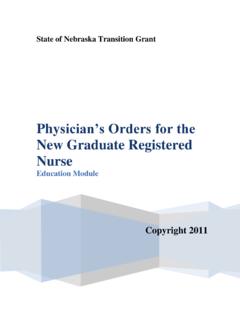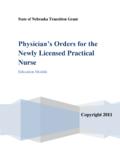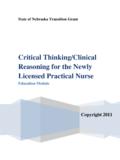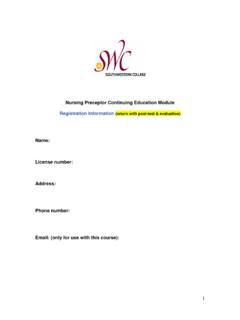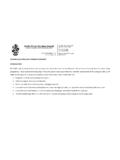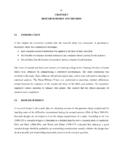Transcription of Delegation for the Newly Licensed Practical Nurse
1 State of Nebraska Transition Grant Copyright 2011 Delegation for the Newly Licensed Practical Nurse education Module 2 Title: Delegation Learning Objectives: Upon completion of this education module, the Newly Licensed Practical Nurse will: Differentiate between the concept of Delegation and assignment. Describe the LPN Nurse practice act for the State of Nebraska. Explain which assignments can be delegated and which assignments may not be delegated to the LPN. Summarize the legal responsibilities of the LPN for supervision and direction of unlicensed personnel. Determine appropriate assignments for unlicensed personnel. Create sample assignments for a group of patients.
2 Interactive Exercises: 1. Review the material that follows and discuss with your preceptor. 2. Explore the website 3. Discuss with your preceptor the LPN Nurse practice act and the difference between Delegation and assignment. 4. Discuss with your preceptor how to effectively communicate assignments (including follow-up) to unlicensed nursing personnel. 5. Listen to report and practice making assignments to unlicensed nursing personnel for a group of patients. 3 Transition to Practice: A. Delegation B. Supervision C. Direction State of Nebraska Title 172 Chapter 99 -- Reference for information important to a practicing LPN Licensed in the state of Nebraska A. 99-001 Scope and Authority Licensed Practical nurses (LPNs) practice nursing dependently at the direction of registered nurses or Licensed practitioners through the application of the nursing process and the execution of diagnostic or therapeutic regimens prescribed by Licensed practitioners.
3 B. 99-002 Definitions 1. Assignment: a Licensed Nurse appoints or designates another person the responsibility for performance of nursing interventions. Assignment IS NOT the transfer of authority; assignments are made to individuals who already have authority to provide nursing interventions either through licensure as a Nurse or through Delegation from the RN. In Nebraska, LPNs make assignments to unlicensed personnel. 2. Delegation : the transference from one individual to another individual the authority, responsibility, and accountability to perform nursing interventions. RNs can delegate to LPNs, but LPNs cannot delegate to unlicensed personnel. 3. Direction: provision of guidance and supervision by a Licensed Nurse or Licensed practitioner who is responsible to manage the provision of nursing interventions by another person.
4 4. Licensed practitioner: a person lawfully authorized to prescribe medications or treatments. C. Standards 1. The LPN participates in the assisting and giving of care by: Providing care for patients whose conditions are stabilized and/or predictable. Under direct supervision of the RN, assists with provision of care for patients whose conditions are not stable and/or predictable. Implements nursing care according to the priority of needs and established plan of care. Implements diagnostic or therapeutic regimens of Licensed practitioners. Directing and assigning nursing interventions. LPNs direct and assign nursing interventions to unlicensed personnel. Providing an environment conducive to safety and health.
5 Documenting nursing interventions and patient responses to care. Communicating interventions and responses to care to appropriate members of the health team. D. 99-004 Standards for Delegation 1. Only RNs Licensed according to the Nurse Practice Act may delegate nursing interventions to be performed by others on behalf of the Nurse . 4 2. Interventions cannot be delegated by an RN to anyone, including the LPN. If an RN delegates these interventions to you, you need to decline, based on your Nurse practice act. You are not legally able to perform these interventions. They include, but are not limited to: Activities including data collection, problem identification and outcome evaluation which require independent nursing judgment, Teaching or counseling Coordination and management of care Triage and/or the giving of advice Treatments which are complex interventions E.
6 99-005 Standards for Direction 1. In the administration and management of nursing care, RNs, LPNs and Licensed practitioners provide direction. RNs and Licensed practitioners provide direction to LPNs; RNs and LPNs provide direction to unlicensed persons providing auxiliary patient care services. The method and degree of direction may vary based upon patient condition, the interventions to be applied, and the qualifications and competency of the person providing the interventions. 2. Licensed nurses must communicate to the unlicensed person the conditions of any assignment. Communication may be either written and/or oral and may include: Specific observations to be monitored, and the expected method of communication to report such observations Specific interventions to be applied, and any patient specific instructions and/or limitations Expected results of nursing interventions Unexpected results or potential complications of nursing interventions, including the method and timeline for communicating such to the Licensed Nurse 3.
7 RNs may provide direction to unlicensed persons through direct or indirect supervision. 4. LPNs must provide direction to unlicensed persons only through direct supervision. You must be physically present to provide supervision. 5. Licensed nurses must monitor and evaluate the nursing care provided by unlicensed personnel to assure that care is adequate and also meets the needs of the patient. 6. Licensed nurses must evaluate the competence of the unlicensed persons providing nursing interventions relative to specific assignments. F. 99-007 Appropriate role of the LPN in intravenous therapy 1. The State of Nebraska allows LPNs to perform these functions, but your facility will determine if the LPN will be permitted to do so.
8 2. A LPN may accept responsibility for provision of the following interventions: Assist in initiating intravenous therapy Monitor the rate of flow Temporarily slow the rate of flow and report observations Discontinue peripheral intravenous catheters that are no more than three inches in length Assist in the administration of blood transfusions, hypodermoclysis, and hyperalimentation Regulate the rate of flow including the use of regulatory equipment Add intravenous solution to an established peripheral line, excluding those on pediatric patients. Solutions must be non-medicated, commercially 5 prepared or prepared by a pharmacist or RN, and may contain vitamins and/or KCl.
9 Acceptable intravenous solutions are limited to those fluids that are generally used as maintenance and isotonic in nature. Change intravenous tubing for peripheral lines only 3. Activities related to intravenous therapy which a LPN MAY NOT accept as directed activities include but are not limited to: Venipuncture for the purpose of initiating intravenous therapy Intravenous medication administration Administration of intravenous solutions via any other route except the peripheral intravenous route Heparin lock flushes Administration of intravenous fluids to pediatric patients Administration of chemotherapy, hyperalimentation, blood or blood products So what does all this mean???? In summary: LPNs in the state of Nebraska cannot delegate (transfer authority) to unlicensed personnel, however RNs may delegate appropriately to LPNs.
10 LPNs do have the authority to make assignments to unlicensed personnel (if they have the training to adequately perform these assignments.) LPNs must directly supervise unlicensed personnel, give them adequate direction to complete the assignment, and correctly evaluate their performance. Question # 1: Which of the following patients would be most appropriate to assign to an unlicensed staff member? Patient who returned from surgery 2 hours ago Patient who had a CVA two days ago Patient needing frequent pain medication Patient admitted this morning with suspected pancreatitis Question # 2: The LPN is working on a rehabilitation unit and has the assistance of 2 unlicensed staff members to care for 12 patients.
